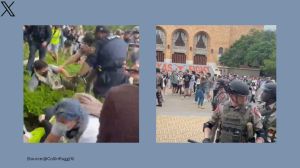- India
- International
US airdrops ammunition, weapons for Kurds in Syria’s Kobani to fight IS militants
The airdrops Sunday were the first of their kind and followed weeks of U.S. and coalition airstrikes in and near Kobani.
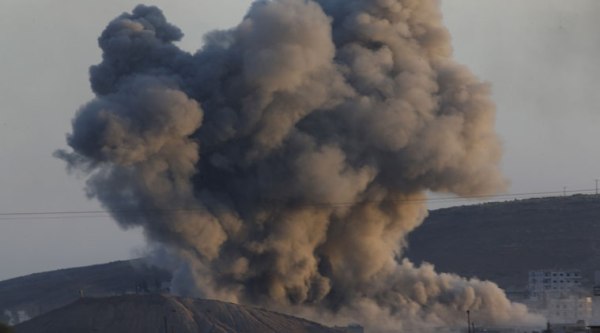 In this Oct. 8, 2014, photo, a huge plume of smoke rises after an airstrike in eastern Kobani, Syria, behind a hilltop where militants with the Islamic State group had raised their flag on Monday, as fighting intensified between Syrian Kurds and the militants as seen from Mursitpinar on the outskirts of Suruc, at the Turkey-Syria border. (Source: AP)
In this Oct. 8, 2014, photo, a huge plume of smoke rises after an airstrike in eastern Kobani, Syria, behind a hilltop where militants with the Islamic State group had raised their flag on Monday, as fighting intensified between Syrian Kurds and the militants as seen from Mursitpinar on the outskirts of Suruc, at the Turkey-Syria border. (Source: AP)
The U.S. military said Sunday it had airdropped weapons, ammunition and medical supplies to Kurdish forces defending the Syrian city of Kobani against Islamic State militants.
The airdrops Sunday were the first of their kind and followed weeks of U.S. and coalition airstrikes in and near Kobani, near the Turkish border. The U.S. said earlier Sunday that it had launched 11 airstrikes overnight in the Kobani area.
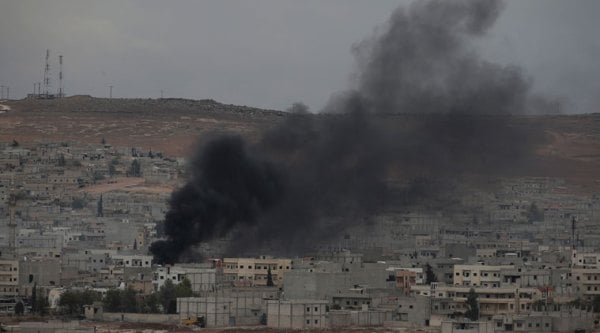 Smoke from a fire rises following a strike in Kobani, Syria, during fighting between Syrian Kurds and the militants of Islamic State group, as seen from a hilltop on the outskirts of Suruc, at the Turkey-Syria border, Sunday, Oct. 19, 2014. (Source: AP)
Smoke from a fire rises following a strike in Kobani, Syria, during fighting between Syrian Kurds and the militants of Islamic State group, as seen from a hilltop on the outskirts of Suruc, at the Turkey-Syria border, Sunday, Oct. 19, 2014. (Source: AP)
In a statement Sunday night, U.S. Central Command said U.S. C-130 cargo planes made multiple drops of arms and supplies provided by Kurdish authorities in Iraq. It said they were intended to enable continued resistance to Islamic State efforts to take full control of Kobani.
READ: ISIS forced out of Kobani but new pressure on Baghdad
The airdrops are almost certain to anger the Turkish government, which has said it would oppose any U.S. arms transfers to the Kurdish rebels in Syria. Turkey views the main Kurdish group in Syria as an extension of the Turkish Kurd group known as the PKK, which has waged a 30-year insurgency in Turkey and is designated a terror group by the U.S. and by NATO.

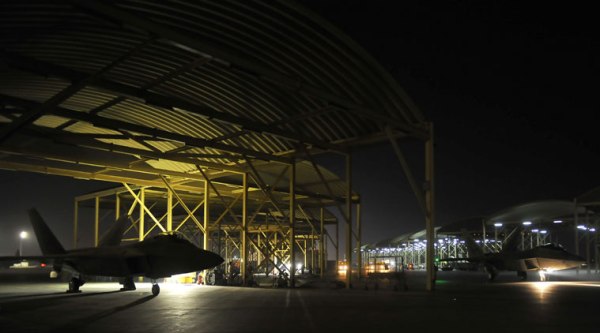 In this Sept. 23, 2014 photo provided by the U.S Air Force, two F-22A Raptor taxis in the U.S. Central Command area of responsibility prior to strike operations in Syria.(Source: AP)
In this Sept. 23, 2014 photo provided by the U.S Air Force, two F-22A Raptor taxis in the U.S. Central Command area of responsibility prior to strike operations in Syria.(Source: AP)
President Barack Obama called Turkish President Recep Tayyip Erdogan on Saturday to discuss the situation in Syria and notify him of the plan to make airdrops Sunday, one administration official told reporters. He would not describe Erdogan’s reaction but said U.S. officials are clear about Turkey’s opposition to any moves that help Kurdish forces that Turkey views as an enemy.
READ: Baghdad not under ‘imminent threat’ from IS, says US
In a written statement, Central Command said its forces have conducted more than 135 airstrikes against Islamic State forces in Kobani.
Using an acronym for the Islamic State group, Central Command said, “Combined with continued resistance to ISIL on the ground, indications are that these strikes have slowed ISIL advances into the city, killed hundreds of their fighters and destroyed or damaged scores of pieces of ISIL combat equipment and fighting positions.”
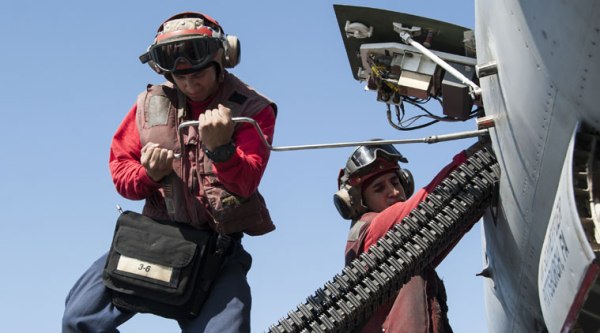 In this photo taken Friday, Oct. 10, 2014, U.S. Navy aircrewmen Victor Medrano, left, and Rene Reyes load ammunition into an aircraft aboard the USS George H.W. Bush in the Persian Gulf. (Source: AP)
In this photo taken Friday, Oct. 10, 2014, U.S. Navy aircrewmen Victor Medrano, left, and Rene Reyes load ammunition into an aircraft aboard the USS George H.W. Bush in the Persian Gulf. (Source: AP)
In a conference call with reporters after Central Command announced the airdrops, senior administration officials said three C-130 planes dropped 27 bundles of small arms, ammunition and medical supplies.
One official said that while the results of the mission are still being assessed, it appeared that “the vast majority” of the supplies reached the intended Kurdish fighters. That official also said the C-130s encountered no resistance from the ground in Syria during their flights in and out of Syrian airspace. The officials spoke on condition of anonymity under ground rules set by the White House.
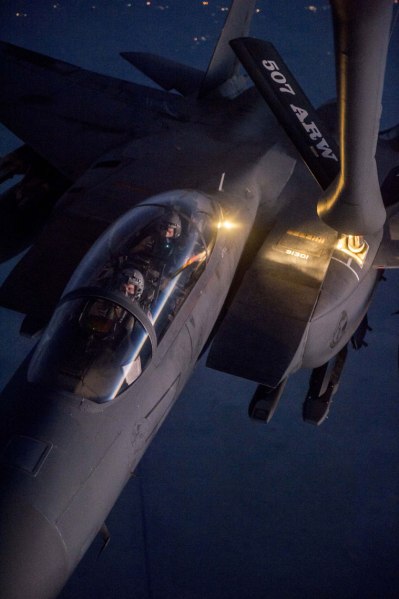 In this Tuesday, Sept. 23, 2014 photo provided by the U.S. Air Force, a F-15E Strike Eagle receives fuel from a KC-135 Stratotanker over northern Iraq after conducting airstrikes in Syria. U.S. coalition-led warplanes struck Islamic State group militants near the northern Syrian town of Kobani, also known as Ayn Arab, near the Turkish border for the first time Saturday, Sept. 27, 2014. (Source: AP Photo/U.S. Air Force)
In this Tuesday, Sept. 23, 2014 photo provided by the U.S. Air Force, a F-15E Strike Eagle receives fuel from a KC-135 Stratotanker over northern Iraq after conducting airstrikes in Syria. U.S. coalition-led warplanes struck Islamic State group militants near the northern Syrian town of Kobani, also known as Ayn Arab, near the Turkish border for the first time Saturday, Sept. 27, 2014. (Source: AP Photo/U.S. Air Force)
One of the administration officials said the airdrops should be seen as a humanitarian move. He said U.S. officials believe that if Kobani were to fall, the Islamic State militants would massacre Kurds in the town.
Another administration official said “you might see more” U.S. resupply missions to benefit the Kurdish fighters in Kobani in the days ahead. Yet another administration official said a land route to resupply the Kurds had been under discussion but would require Turkish cooperation. He said talks on resupply needs and means would continue.
Apr 25: Latest News
- 01
- 02
- 03
- 04
- 05





















